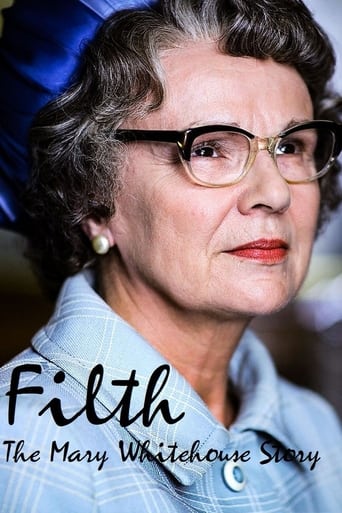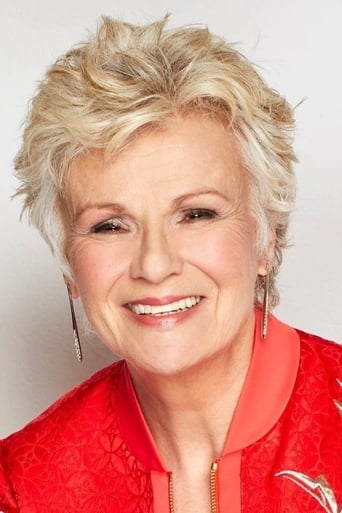Filth: The Mary Whitehouse Story (2008)
The story of the rise of morals crusader Mary Whitehouse in the UK in the 1960's.
Watch Trailer
Free Trial Channels
Cast


Reviews
Thanks for the memories!
A Disappointing Continuation
Blending excellent reporting and strong storytelling, this is a disturbing film truly stranger than fiction
Excellent characters with emotional depth. My wife, daughter and granddaughter all enjoyed it...and me, too! Very good movie! You won't be disappointed.
BBC's "Panorama" has yet to show an episode entitled "The Joy of Bestiality".Now that may be a matter of regret for some but I daresay most viewers are happy that censorship in some for or another is enforced at the national self - styled "centre of broadcasting excellence".Equally your children are unlikely to be confronted by CBBC transmitting "Paedophilia for Kiddies".In some small measure this circumstance prevails because a middle aged provincial schoolteacher took on the might and arrogance of the British Broadcasting Corporation nearly fifty years ago,and despite she and her family being vilified in the liberal press and of course by the BBC's coterie of in - house intellectuals who believe it is their God - given duty to shock us proles and mock our chavvish bourgeois morality. The D.G. of the BBC at the time was the megalomaniacal Sir Hugh Carleton - Greene who resisted any whiff of censorship with a rage Pavlov's Jack Russell would have been proud of. But,unbelievably,the peasants who supported Mrs Whithouse made up a significant proportion of his viewing figures and her steely determination - with the indefatigable support of her husband who was himself the victim of an appalling campaign of mockery by those oh - so - smug writers and producers who shamefully seized on the fact that he was involved(although blameless) in a fatal Traffic Accident at the height of his wife's campaign. Clearly quite mad it is a matter of shame that Carleton - Greene was able to hang onto his job for so long. But sometimes it does appear that God is on the side of the small battalions because Mrs Whitehouse won her personal war of attrition and the D.G. was forced to step down. His hatred of censorship did not extend to giving his opponents the right to reply,a nicety he did not lose any sleep over. In "Filth - the Mary Whitehouse story",Mrs Whitehouse is portrayed as a Mrs Grundy for the 1960s,the sort of woman who would place a cover over the legs of her piano. In settling for parody the producers have been fair - minded as the D.G. himself is made out to be a foul - mouthed, sexist skirt - chaser who presumably - we are meant to believe - wouldn't last ten minutes in the 21st century diversity - centred BBC.Well,maybe. Miss Julie Walters gives her considerable all in the title role,falling just the right side of caricature although her Brummie accent thickens considerably when the actress wishes to patronise. This is just an old battle in an old war now of course but,just occasionally,the Whitehouse Spirit resurrects itself when some overpaid oaf steps over the line and outrages the peasants(Viz:- Ross and Brand last year)and the Corporation is forced to rattle a few sabres. But,generally speaking we get the broadcasting media the "Guardian" readers deserve and the rest of us can either like it or lump it. I must admit that generally I choose to lump it.
This account of the transformation of an ordinary suburban mum and art teacher into a controversial national figure is a lot better than it might have been. Julie Walters as Mary captures her ordinariness and her determination. She is much helped by Alun Armstrong's subtle performance as Mary's supportive if sometime baffled husband Ernest. Hugh Bonneville though at times rather Basil Fawlty-ish as the progressive but arrogant BBC director-general Hugh Greene provides an admirable foil (they never actually meet).Mary Whitehouse started her campaign to clean up television (originally unfortunately named "Clean Up National Television") after seeing a rather dull discussion program on pre-marital sex broadcast by the BBC in the early evening. Despite widespread opposition she developed a taste for being in the public eye, and was an active promoter of TV censorship for the next 30 years. The film credits her with forcing Greene's resignation, though others claim the real issue was Greene's failure to get along with Lord Hill, the oleaginous BBC chairman after 1967. Certainly Greene's philosophy on broadcasting was completely opposed to Mary's, and it has to be said that it was partly due to her that the BBC became less adventurous in the face of her attacks, some of which were downright silly, the attacks on "Dr Who" and the Beatles's lyrics for example. With all respect to her son Richard, who has a review on this page, she may have been serious and sincere, but she represented and aroused the forces of bigotry, ignorance and prejudice. The worst that can be said of Greene is that he did not handle her very well. Later directors-general, including his immediate successor Charles Curran were better at it. Even so she had a chilling effect on British television.This program goes fairly easy on Mary and does not fail to point out that Greene and other opponents often over-reacted. She had imitators elsewhere, Patricia Bartlett in New Zealand and Fred Nile in Australia for example, and of course the US is full of anti-smut crusaders. Unlike the US, Britain's media is rather centralized – the BBC had a monopoly in TV until 1956 and there was a duopoly with ITV until the 1980s – and this gave someone like Mary unwonted influence. The atmosphere of the sixties is wonderfully re-created and the BBC has to be congratulated for its even-handed telling of a story very painful to some broadcasters.
I never did have much truck with Mary Whitehouse. In the early days her heart was probably in the right place, bless her. She saw the onslaught of the permissive society as a catastrophe for the moral fibre of the nation while homosexuality and pre-martial sex were the start of the slippery slope to hellfire and damnation. She was right, to the teeniest, weeniest degree, about what our children should or should not be exposed to and that full frontal nudity and sodomy might do more than frighten the horses when we are about to sit down to our evening meal. But she was also a bigot, the narrowness of whose vision would have been awesome were it not so awesomely worrying. And she never listened; never took on board the opinion of anyone but herself."Filth" starts off portraying her as a sympathetic, matronly type, a school mistress with a genuine affection for her students, and a caring wife and mother, quite prepared to enjoy a bit of the old heave-ho herself in the sanctity of the marriage bed. But the moment television started to reflect the real world as it was in the early sixties, (heaving and ho-ing outside the marriage bed, cussing and swearing on every street corner), Mary had apoplexy and demanded that Sir Hugh Carleton Greene, Director General of the BBC, call a halt to it.Now I am not knocking morality. There is right and there is wrong and there is the expression of both but there is also freedom of speech; there are often two sides of almost every story and there's nowt as queer as folk, as they say. Mary simply didn't see it that way. She didn't so much quote the Bible as rewrite it in her own words. Interestingly, "Filth" began by making her sympathetic, (as I've said, her heart was in the right place), and making Carleton Greene the villain of the piece, (sexist, patronizing, condescending, arrogant, you name it), but as Mary's fame grew, (she came to love the limelight, the attention and above all, the power she wielded), our sympathies shifted to the poor, put-upon Greene, driven close to bonkers by this needling, insidious little woman.Were it not for the fact that she strove to silence all forms of expression with which she didn't agree, destroying reputations and careers as she went, she might just have been considered another eccentric and I worried that Julie Walters would play her as an extension of her eccentric persona's such as Mrs Overall. However, I really ought to have had more faith in Walters who is one of our finest actresses and who is outstanding here. (The fact that she made me almost like Mary is testimony to that). Hugh Bonneville, too, had a lot to do with making Greene change from arrogant snob to crusader to victim in the space of ninety minutes. (The film only concentrates on the period of the 'feud' between Whitehouse and Greene).Perhaps the writing could have been sharper at times, though the period was beautifully delineated from the outset. This was indeed a vanished England of simplicity and innocence that made you wonder, at least initially, if Mrs. W might not have been right about the tide of 'filth' that was coming down the tube to change it all. But as you watched her change from village school-ma-rm to Mussolini in a twin-set and pearls, you realized it wasn't the 'filth' was was the problem but the knight in very tarnished armour.
It is a strange experience, seeing family members being portrayed by actors, and events for which one has a well-established store of mental pictures being re-presented through the director's eyes. It was never going to be entertaining. It was hard to see Ernest's trauma (he never fully recovered) of the road suicide being played out for a casual audience. After a lifetime of watching vitriolic attacks on Mary, we inevitably found ourselves watching and waiting for the 'catch'. But in general, the play was kind to Mary and hard on Greene, and I can see that the tussle between them is a perfect dramatic vehicle for a romp through the prejudices of the baby boomer generation, given spice by the addition of a relatively serious take on Mary's aims which the BBC was so reluctant to afford her at the time. I can't comment on the production values, which had at the start a bit of an 'acorn antiques' flavour. The bicycle-riding, dowdy, local gossipy lady is a Walters 'character' which bears little relationship to Mary's life or character. Her moment of snapping and snarling at the kissing couple in the car was absolutely unlike her. The portrayal of the three abstentious sons at the party (the eldest was married and had long left home by then, and wasn't there) was an irritating but unimportant misrepresentation. Mary's seriousness of intention, however, does emerge when portrayed on the platform, and some of her 'charisma' also is conveyed. The main flaw is the total omission of the fact that Mary was portrayed as an art teacher. Yes, she was an art teacher, but had been given responsibility for moral and sex education in the school, at a time when such an activity had no road map. It was a pioneering role which she had been asked to play. It was concerns arising from serious, timetabled discussion which drove her to deal with pressures on the kids from the outside world, rather than a personal, (Intrusive?) interest in the lives of her pupils. This has the effect of emphasising the common perception that she was a self-appointed moral guardian; at the start, she was not!








